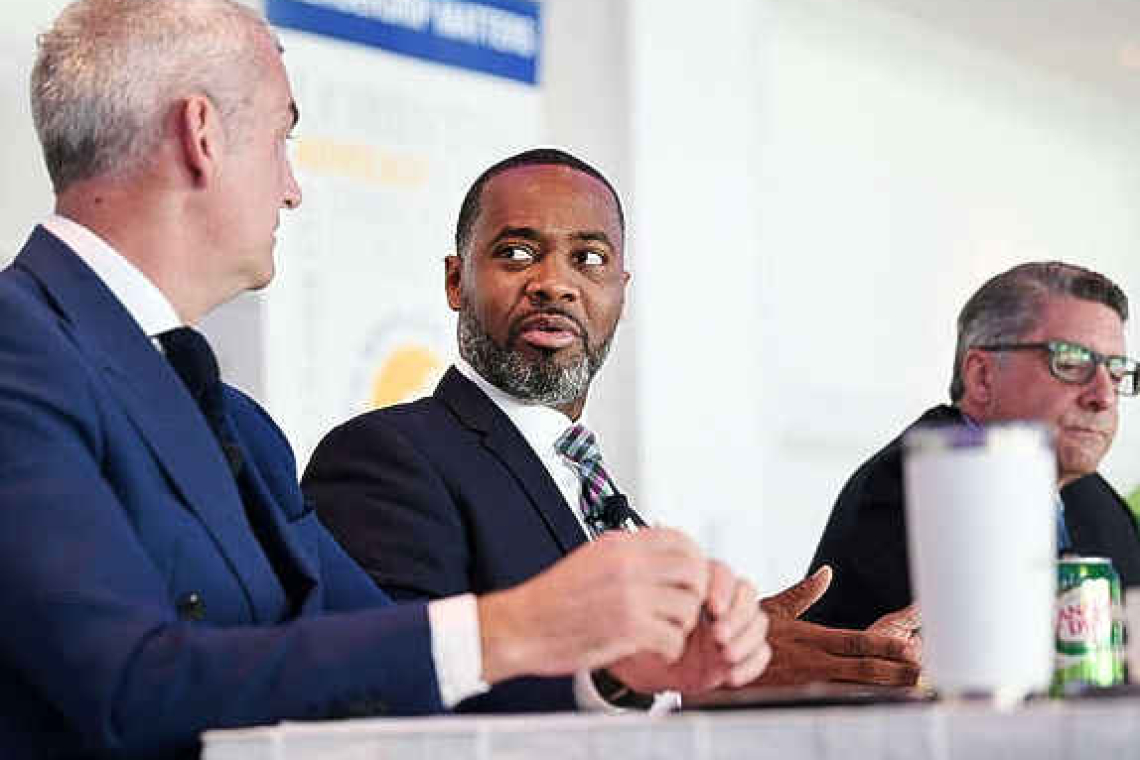Arthur Wightman (left) with the Premier and Minister of Finance David Burt (centre) and Christopher Schaper (right).
HAMILTON, Bermuda--A business leader laid out the stark reality of the economic crises facing Bermuda, warning that government debt, liabilities and guarantees exceed US $7 billion.
A speech on Monday morning included references to the mounting debt, continued deficit spending, substantial pockets of poverty, a shrunken tax base, unfunded liabilities, high unemployment and the several hundred among the ranks of the homeless.
The remarks from PwC’s Bermuda Territory Leader Arthur Wightman came at the Chamber of Commerce Budget Breakfast event, before he introduced Premier David Burt.
He minced no words in laying out some facts; The annual deficit for 2022/23 is expected to be $77 million or $7 million higher than planned and $11 million worse than 2021/22; Debt stands at over $3 billion with a debt to revenue ratio of approximately 275% versus a benchmark of 80%, with approximately 12% of government income required to service that debt; Unfunded pension liability estimates including the contributory pension fund stand at approximately $3 billion and will run out in the next 20 to 30 years, absent urgent action; Government guarantees exceed $1.1 billion and are expected to rise to more than $1.3 billion with the Fairmont Southampton and Morgan’s Point guarantees.
He continued: “So if you add up the debt, liabilities and guarantees you are at around $7.4 billion. This, for an island of 60,000 people, of which only about 50% of that population is working. That equates to almost $0.25 million per worker. That level of financial obligation is incomprehensible for the average person. And yet it needs to be comprehended and addressed.”
Wightman said that Bermuda needed 10,000 people added to the workforce as well as plugging the brain drain by stemming emigration.
He noted: “Government has promised a plan within the next few weeks.”
Wightman was speaking before Burt delivered remarks to the business community with regard to his annual budget, delivered to Parliament on Friday.
A panel assembled by the Chamber to discuss the budget included: Chris Schaper representing international business; Myra Virgil representing the philanthropic and social sector; Stephen Todd representing the tourism sector; and Nathan Kowalski who is the chamber chairman and a resident economist.
Wightman said: “We are living through extraordinary times with trends like climate change, technological disruption and social instability disrupting and reshaping the business environment. According to PwC research, three quarters of global [Chief Executive Officers – Ed.] CEOs believe global economic growth will decline over the next 12 months and according to Chamber research only one third of business owners in Bermuda are confident in Bermuda’s economic future.
“There is palpable concern around the risk presented by Bermuda’s debt, liabilities and guarantees. Bermuda’s reliance on international business (IB) cannot be understated. IB contributed over $2 billion to the island’s economy in 2021 and even marginal adverse changes could jeopardise the island’s going concern.”
Wightman said while it was fortunate that IB was on an upswing, the Organisation for Economic Co-operation and Development’s (OECD’s) global minimum tax may force Bermuda to compete in areas other than tax, or even regulation. He said it may mean the island has to complete in terms of “talent, lifestyle, immigration, cost of living and healthcare – not necessarily areas Bermuda has a strong value proposition in on a relative basis.”
He said the government/IB partnership needs to be more symbiotic and co-operative than ever before. He welcomed a budget focus on reducing the tax burden on employers, something he believes will lead to more entrepreneurial investment, job creation and growth in business.
Wightman also noted the sustainability risks of the shrinking and ageing population, especially in the current challenging economy. He said: “Retailers, taxi drivers, restaurateurs have been fighting a war of attrition while Bermudians have been leaving now for some time, seeking better educational, health, welfare and economic outcomes offered in particular by the United Kingdom.”
He accepted that payroll tax changes announced in the budget may allow people on lower incomes to catch a break, with a more progressive tax system. But he cited government figures that 10% of the population were in poverty in 2022.
He said: “Depending on the measure, this number could be significantly above 20%. Youth unemployment at 30%, over 2,000 Bermudians on financial assistance, at least 650 people experiencing homelessness.” ~ The Royal Gazette ~







